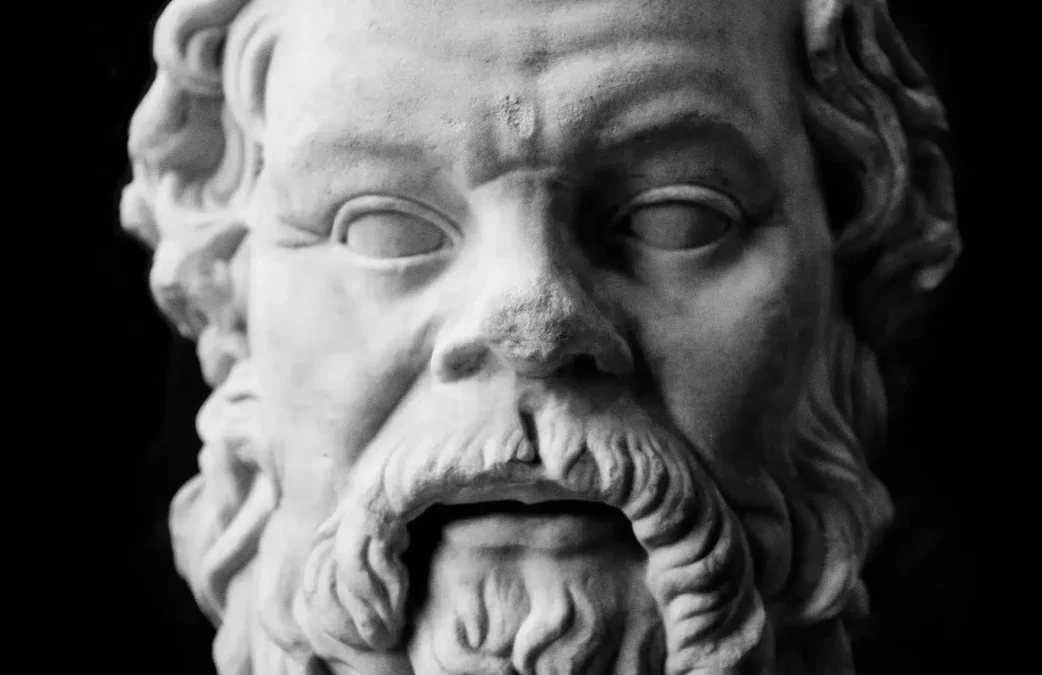I have had a fascination with philosophy, and particularly with Socrates, ever since winning the book, A History of Western Philosophy by Bertrand Russell, as a prize at school. As someone passionate about personal development, and as a professional coach, it continues to amaze me how many important themes, such as self-inquiry, question technique and ethical decision-making, can be traced back to the thinking of Socrates, Plato, and Aristotle.
Socrates and the importance of self-improvement
Arguably, Socrates was the father of personal development as well as Western philosophy. He is most associated with the Greek aphorism, “know thyself” and is quoted as saying,
“To know thyself is the beginning of wisdom”
Socrates
This premise is echoed in personal development literature, such as Stephen Covey’s The 7 Habits of Highly Effective People, which starts with mastery of self before moving onto success in the public field or in the leadership of others.
It is somewhat tautological to say that self-improvement should start with self, but it is a point that is often overlooked. All too often, when setting goals, we choose to focus on people around us. This might be in making unhealthy comparisons (a particular problem in the age of social media), blaming our situation on others, or endlessly seeking to fix everything around us, without doing any home maintenance.
To know that we have progressed – in whatever field we want to develop – we need to be able to manage a process of improvement. As the adage goes, “you can only manage what you can measure.” That being the case, when setting a goal, you need to define the start-state as well as the end-state. Self-examination should therefore be the first step of productive personal development. We start by working out where we are now. And the most important aspect of this self-examination is to identify the motivations, beliefs and ideals that inform our behaviours.
Socratic ethics, virtues, and values
Socrates, in his dialogues, sought to seek out and test the foundations on which people based their ideas and actions. He also believed there were right and wrong actions, good and bad decisions. In other words, he sought virtuous behaviour and ethical decision-making.
Socrates believed in an objective good, a standard of right and wrong. This contrasted with the Sophists who treated truth as relative. The Sophists were more concerned with eloquent debates and winning arguments; it was less important whether what they were arguing for was true or not. Today a Sophist might be compared to an unprincipled lawyer who is willing to defend anyone for the right price, or a rotten politician who is willing to say anything to bolster their position. Few of us would claim to know objective truth but fewer still are comfortable with such extremes of relativism. Most people prefer to have principles to live by.
Are there immutable and irrefutable principles? It is an excellent philosophical question and one that is still being asked. Socrates did not claim to know, or presume to dictate, the standard of absolute truth, but he always strove to find it. I think that is a great place to start. We can imitate the likes of Socrates by having the humility to admit we may not know the truth and that we are imperfect people. Add to this a curiosity to seek out the good and a determination to change, and we find ourselves describing what today we call a growth mindset.
We might not have thought of it in these terms before, but this search for truth is – in philosophical terms – about ethics. It is about making the right choices. If these choices are about acting beyond pure self-interest, then we are also talking about virtues. And there is the rub. A lot of what we desire might be purely selfish; it may even be base or wrong. Self-examination can require us to be brutally honest with ourselves about what we value and why.
Integrity and leadership
Leadership also starts with self. If you cannot lead yourself well, how can you expect others to follow you? That is why leadership itself is a development journey akin to broader self-improvement; it is a path of learning much more than it is a role or title. Which ones again leads us back to the need for self-inquiry and the need to ask some questions.
If you compare lists of leadership traits, probably the most common trait you will come across is integrity. In my military career, it was certainly considered the most important of leadership traits as a failure of integrity was the quickest way to lose credibility as a commander.
Integrity is about walking the talk; about acting in accordance with the standards that you set. But this begs the question, what is the right standard? In theory, a bad boss could have integrity of a sort if they acted in accordance with their ideals, even if bad ones. So, integrity must be coupled with the idea of good leadership, not just effective management. And hence we find ourselves back in the realms of ethics, virtues, and values again; as we need to know our principles to act in alignment with them, and the precepts we follow should be good ones.
Socratic questioning
Similarly, to Confucius and Buddha, Socrates’ style of pedagogy was through inquiry. In other words, he taught by asking questions. In this way, I like to think that Socrates is the grandfather of coaching as well as philosophy and self-improvement!
Socrates developed the elenchus or Socratic question technique. The aim of this technique was to clarify someone’s position on a subject and then question the foundational assumptions of the idea to test its logic. The technique has been adapted and used in diverse fields such as debating, legal cross-examination and coaching. If you are curious about the world and like to understand ideas and test beliefs, then it is an important tool – even if just to use in everyday conversation.
“The highest form of Human Excellence is to question oneself and others.”
Socrates
In this context, we can use the same process to question ourselves. If we do not have someone to help us, such as a coach or counsellor, we can do some self-reflection. Using a journal or taking notes can be helpful in this process. Here is a simplified way to use the Socratic method when using it for self-examination:
Reflect
Reflect upon a statement or a decision that you have made. Some of the most insightful statements and decisions to investigate are the more negative ones. For example, we might choose not to do something, saying “I can’t do that!” Hold that thought or write it down.
Refine
The next step is to refine. Here the context of the word refine is like that of refining precious metal; the aim here is to expose our thinking to the flame, to burn away untruths and remove the impurities from our thinking.
To do this we must examine the assumptions that have informed our words and actions. If we don’t think we can do something, why is that? What is the belief or feeling that underpins this? Some assumptions are reasonable, some are simply false. The purpose of this stage is to sift what is true from what is not.
Re-state
Once we have examined the thinking behind our statement or decision, we can re-state it, bringing in our new knowledge. If there was a false assumption identified, it might be we can turn the statement on its head. We might be saying “I can” instead of “I can’t”.
Repeat
The next step is to further examine the new statement. Are there further assumptions that need to be identified and tested? In this way the process is like the 5 Whys interrogative technique; we keep on asking the questions until we get to the fundamental issue. As we delve ever further into our thinking, we should be able to identify the core beliefs that shape our thinking, the standards that drive our behaviour and the values that inform our decisions.
Know thyself
Socrates commitment to enquiry, truth and ethics got him into trouble. He was nicknamed the gadfly; an annoying biting insect, by self-important and self-proclaimed wise people. They did not like to be exposed by Socrates as his questioning revealed their fallacies and undermined their position. He so challenged the beliefs and norms of his day that he was sentenced to death. His integrity was amply demonstrated in his unwillingness to back down in his search for truth.
Revealing the truth can be uncomfortable and maintaining our integrity often comes at personal cost. Self-inquiry can be a humbling process, but it is a vital one if we truly want to be happy in who we are and successful in what we do.
So, be prepared to be confronted with some brutal facts as you begin your self-examination. And don’t just make it a one-off, instead, develop a habit of challenging your own thinking. For all of us, whether in leadership positions or not, this process of reflection is a vital part of self-improvement.
Be like Socrates and seek to know thyself.



